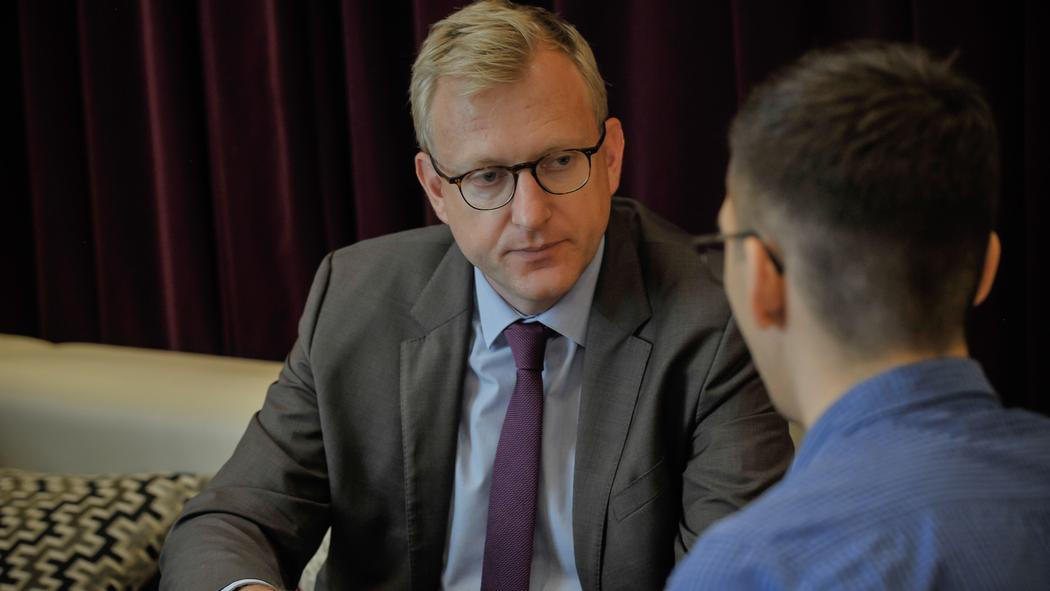The window of opportunity to make bold moves on the creation of an EU defense union as well as on support for Ukraine in its war against Russia is slowly closing, says Steven Blockmans, one of the leading analysts of the prestigious Brussels-based think tank CEPS - Center for European Policy Studies, in the interview with Karel Barták for INFO.CZ.
The European Commission has proposed its first ever "industrial defense strategy". It is presented as its strongest response until now to the Russian military threat and support for Ukraine. But is it really a game changer?
Launching an industrial defense strategy was long overdue. The signs were already on the wall for quite a while that the member states had hollowed out the national defense capabilities in the years of austerity that followed the EU debt crisis 2007–8. This was followed by a number of security crises in the neighborhood: War in Syria, where Russia played a role. The Russian land grab of Crimea and the war in Donbas which never stopped. The Brexit debacle which removed from the EU the national contribution of the UK, one of Europe's military strong arms. And of course the Trump administration.
The member states and the European Commission hence knew for a very long time that the security environment in which they were operating is becoming more and more dangerous. And now, two years after the start of the full scale Russian invasion into Ukraine, it has become plainly evident that the EU member states cannot rely on existing stockpiles consisting of old legacy equipment, which by now has been to a large extent anyway supplied to Ukraine. New production needs therefore to be stimulated in order to modernise and re-equip the armed forces of the member states. But the need is nothing new – that is why the strategy was long overdue.
Is it a game changer? If yes, it would have to be a transformational proposal put on table by the Commission which, if endorsed by the Council, would change the way in which the EU procures and produces military equipment. One might say that there are some innovative elements – joint producing and procuring is indeed new for the EU. But suggesting that it is so dramatic in nature that it will provide the EU with the military capacity to sustain the tensions which it is facing – no, in my view the proposal is not sufficient.
The EU machine is slow and the decision making cumbersome.
What are the chances of this strategy to be rapidly endorsed? Will the process show that defense and security are finally becoming a part of the core business of the EU?
The Von der Leyen's Commission is politically astute enough to read the tea leaves of the capitals. It has already found endorsement from many for this strategy. Perhaps it goes too far in the eyes of some, it might seem as a competence grab by the Commission by others, but Von der Leyen has played it rather safely. I think endorsement will follow. Although some will have more trouble accepting the proposal. I have in mind Hungary, perhaps Cyprus.
For some time already we are witnessing in Europe a lot of strong rhetorics in favour of Ukraine, but not that much happening on the ground. Is it just a kind of standstill before a new qualitative and quantitative leap? Or is there a gap between rhetorics and reality?
I am afraid it is the latter. The EU machine is slow and the decision making cumbersome.
The general endorsement of the EU new defense industrial strategy will be the proof of the shared strategic culture across EU, with perhaps the exceptions mentioned. Meaning that Russia is considered an existential threat not just to Ukraine but also to other parts of Europe. This baseline is generally agreed.
But there are differences at the next level. For instance boots on the ground suggested by Macron, to which Scholz immediately reacted with a big NO. The threat perceptions among member states are still quite different. As to the level of exposure what new commitments to Ukraine war effort would mean for homeland security, in particular in Germany. Of course the Russian propagandists and Putin himself were quick to respond, trying to sow more division and expose the weakness of the EU as a whole.
The "boots on the ground" remark has been explained and even endorsed by others, including the Czech president Petr Pavel. Would you consider it as a yet another goal to be reached and overcome in the long process of military support to Ukraine – howitzers, tanks, missiles, warplanes and so on? Why can't we learn from our own mistakes?
That is a common feature of the EU politics. The level of ambition is being constantly increased incrementally as a result of common recognition that this is becoming a long war and that EU or the collective West will have to do more in order to support Ukraine in fighting for our values – and our security as well. A soubresaut is not to be expected with the compromise seeking machinery of the EU.
Statements by Macron, Kallas, Pavel have the merit of putting raise the bar a bit higher and allow the dicussions to progress faster by trying to weaken the resistence that exists in some capitals and which has ben delaying deliveries, as we have seen of the last two years. The latest chapter now is about the Taurus missiles from Germany, missiles of the type which other countries have already equipped Ukraine with.
There is no EU capacity at present to produce the quantity of ammunition shells necessary to equip Ukraine with what it needs and what has been promised.
Czechia has stirred some water with its initiative to rapidly buy ammunition for Ukraine in third countries. It was received with mixed opinions, while it is obvious that Ukraine needs the shells desperately and immediately. Why?
The Czech initiative is obviously a desperate measure taken at a very late stage. Acknowledging that the EU and member states have not met their promised target to deliver one million shells by March 2024 and are far off target. Therefore a desperate move, in order to honor a promise.
The discussion, nevertheless, still revolves around the French insistence on buying European, on producing European, which gears the EU defense industrial policy up for the long term. The logic of this says that any type of precedent of acquiring ammunition and other equipment outside Europe delays the progress that could be made in making strategic autonomy a reality.
Other states which are emotionally and physically closer to the Ukrainian cause want understandably to see quicker action to prevent the Ukrainian armed forces from falling far behind and giving momentum to the Russian offensive.
The High Representative Josep Borrell and commissioner Thierry Breton were claiming last week that the EU arms industry is already reaching the necessary capacity to produce enough ammunition for Ukraine; it's just question of financing. To many this was a surprise. Do you see the discrepancy?
There obviously is a discrepancy. There is no EU capacity at present to produce the quantity of ammunition shells necessary to equip Ukraine with what it needs and what has been promised. Otherwise the Commission itself would not have suggested that the EU would be able to muster 1.3 million shells by October. So there is a gap.
And the timeline of which our political leaders may be speaking about, unifying structures which should allow for the production capacity to be defragmented across Europe and allow for those supplies of arms respond to the urgency on the battlefield that the Ukrainian armed forces are meeting, does not correspond to the time gap which is of existential nature in the war.
Their ideas about that the fact that the capacities in principle and that the financing may be there, with a bit of seed money to stimulate the investment by other sources, is merely intended as a unifying measure to defragment the arms demand which the EU-27 states are formulating. Nothing more.
But the Czech proposal is filling this gap. Is Czechia showing the way, or complicating the picture?
The Czech proposal puts it indeed closer to the heart of the discussion which is ultimately being decided by the bigger member states with more formidable defense industry. It brings it closer to the core initiatives. It is very welcome that Central European state like Czechia wades into these debates. It has its own domestic production which it wants to protect and which it wants to see well aligned and incorporated into any future harmonising efforts in the defense industry sphere.
Germany has been contributing most in military and financial support to Ukraine war effort. France has been lagging behind.
Emmanuel Macron is positioning himself as the leader of Europe vis-a-vis Russia. He is criticising the Germans who react bitterly. The debate is degenerating in a row between the two most important EU players. Do you find it worrying? Can it be easily overcome?
It is absolutely disturbing. Disunity among the big players in security and defense is unwanted, given the formidable challenges Ukraine is facing now and the EU will be facing in the months to come. I understand the German reaction to Macron statements. In nominal terms, Germany has been contributing most in military and financial support to Ukraine war effort. France has been lagging behind.
France has always been hiding its support for security reasons, but it was pushed last week to publish some figures – that show they are far behind the German effort. Although they do not say that they have supplied any missiles because that is a too sensitive information to be disclosed. So we still do not know exactly where they are; but we know that Germany is far ahead.
But, at the same time, that France is maybe delivering a more hard-hitting equipment than the Germans have been willing to send to Ukraine. Yes, there is a bit of truth on both sides which also means that there should be room for compromise between the two.
If one brings it back to the defense industrial scheme, France – with the support of a couple of member states on the eastern flank, i. e. Poland and Estonia – has been suggesting more innovative ways of investing capital through the eurobond type of system to channel finances for the lethal aid to Ukraine, a proposal Germany has traditionally resisted. Here, indeed, we need some rebalancing of the compromise solution across the board between the two parties.
A move to seize assets of the Russian Central Bank frozen on EU accounts would open up possibility of retaliation towards EU assets in euro denomination being held in Russia and also other places.
The countries closer to Ukraine can play an important role here, for instance, Czechia or Estonia. Poland is already doing it as a part of the Weimar triangle with Germany and France. Smaller countries like Czechia or Estonia can play a role in brokering ultimately wider supported compromise solutions which in a typical EU way will move the level of ambition up, although not to the extent which is needed in addressing the situation on the battleground.
Speaking about money – we are hearing for a very long time about the use of the Russian assets frozen in EU banks, but not much seems to be happening. Do you have a clue?
On the one hand, you could say that if the political decision has been taken to militarily equip Ukraine in defense against the Russian onslaught, it would also be obvious to make Russia pay for the damage it is inflicting in Ukraine and for the victims as a result of its war of aggression. It should be a no-brainer.
I think the wariness on the side of the EU and the member states stems from the legal arguments that a precedent might be created, meaning that the immunity of state assets abroad is no longer sanctimonious, as it has been enshrined in UN conventions. Legal grounds would need to be very strong in order to find an exception to that agreed universal rule. Which I think can be perfectly found – in blatant disregard of the UN supreme authority, the UN General Assembly resolution condemning the Russian war of aggression, the Internation Court of Justice's order to Russia to stop its war of aggression, and of course, all the war crimes which have been documented.
They second argument is an economic and financial one, with more influence on member states. A move to seize assets of the Russian Central Bank frozen on EU accounts would open up the possibility of retaliation towards EU assets in the euro denomination being held in Russia and also other places. And creating a chilling effect on investment into the Single market from China, Saudi Arabia, other Gulf states, and lead to capital flight. So some eurozone governments have been reluctant.
But this being said, they have unanimously agreed now, and a council regulation has entered into force two weeks ago, to cream off the proceeds, the windfall profits, of the frozen assets of the Russian Central Bank. What has not been decided yet is to bring this money into the EU budget in order to serve for the financing of repair in Ukraine, which requires again a unanimous decision by member states. That is the next step. It is going too slow and I understand the American concern about this.
EU is much stronger if united on these matters. Divided we fall.
Eurosceptic and populist political forces in the EU are on the rise in many countries. These parties are quite receptive to Russian propaganda. Do you see many countries joining Hungary or Slovakia in the month and years to come? Is the window of opportunity to collectively resist Russia limited in time?
The window of opportunity to make bold moves on the creation of an EU defense union as well as on support for Ukraine in its war against Russia is slowly closing. Especially because the decision making in the EU is done by consensus, if not by unanimity in these areas.
The main reason is the rise of the far right parties in many countries. It is a bit hypothetical to predict from the polls in all those member states whether the election results will be sufficient to move the needle at the EU level. But indeed, the block of pro-Russian regimes in the EU is expected to grow. Another difficulty will arise if, in the autumn, Mr Trump returns to the White House. We already see those political interplays happening, between the Hungarian leadership and the Trump campaign for example.
So the window of opportunity is closing. But I am not so sure that it will lead automatically to a more conciliatory approach to Mr Putin, because the majority of member states of course are still very much against any type of appeasement, and in fact they have moved further away, if the repositioning of Emmanuel Macron is anything to go by. At the beginning of the war he was saying we should keep the channel to Putin open, and is now operating a 180 degree U-turn. So I do not see that this change would create another Munich '38 situation in the EU.
However, the division within the EU would make it incapable of making decisions, making it irrelevant. A two-speed Europe would have to be created. That would not happen overnight….
Yes, that would be the unfortunate consequence. The EU is much stronger if it is united on these matters. Divided we fall. We would become more vulnerable not only to disinformation campaigns in our national elections and EU coordination but also in hard security terms. This is a subject for our military planners. Disunity is absolutely the Achilles' heel for the preparation of a truly European response if such threats are being ramped up.
Steven Blockmans
Steven Blockmans is one of the leading analysts of the prestigious Brussels-based think tank CEPS (Center for European Policy Research), specializing for a long time in Central and Eastern Europe, including the Balkans and the post-Soviet countries. Lecturing at a number of universities in Europe and overseas, he is the author of a number of books and publications and is currently also the editor-in-chief of the European Foreign Affairs Review magazine. He is involved in various analytical and research bodies run by EU institutions, and his views influence their thinking and practice.








